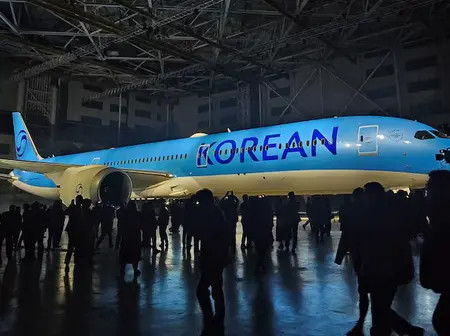On 25 August 2025, Korean Air announced its largest-ever aircraft procurement deal, committing to purchase 103 Boeing jets worth approximately $36–37 billion.
The announcement was made during South Korean President Lee Jae-Myung’s visit to Washington and amid ongoing trade discussions with the Trump administration.
The agreement came alongside a $13 to $14 billion contract with GE Aerospace for engine purchases and maintenance, bringing the total investment to around $50 billion.
The massive order includes a diversified mix of Boeing aircraft: 50 of the single-aisle 737-10s, 25 mid-size wide-body 787-10s, 20 large wide-body 777-9s and eight freighter-capable 777-8Fs. All aircraft are scheduled for phased delivery through 2030.
Korean Air’s CEO, Cho Won-tae, underscored the purchase’s strategic intent: the enhanced fleet will support route expansionespecially to the U.S. and Latin America and streamline operations as the airline integrates with Asiana Airlines following last year’s acquisition.
The deal carries significant geopolitical undertones. Aligned with recent trade negotiations, the order reflects strengthening U.S.–South Korea aerospace ties. U.S. Commerce Secretary Howard Lutnick hailed the agreement as a boost for American aerospace exports and manufacturing jobs, while Korean Air highlighted the deal’s role in reinforcing long-term U.S. industrial partnerships.
Beyond its commercial implications, the deal promises substantial economic benefits. Boeing touted the order as its biggest wide-body contract from an Asian airline, while forecasts suggest the agreement could support up to 135,000 U.S. jobs related to aircraft manufacturing and supply chains.
Fuel efficiency and sustainability are key themes driving the acquisition. Models like the 777-9 and 737-10 are estimated to reduce fuel use and emissions by approximately 20 percent compared to older aircraft, while the 777-8F freighters offer around 30 percent better fuel efficiency per ton than legacy freighter models.
The timing of the order during a summit with President Trump ties directly into U.S. trade strategy, where airlines and governments have placed significant Boeing orders to secure favorable terms.
South Korea’s move mirrors similar patterns seen with other international carriers amid geopolitical leverage.
In summary, Korean Air’s landmark Boeing order is as much about fleet modernization as it is a strategic alignment with U.S. economic interests.
The acquisition positions the airline for global expansion and cements its role as a major client of Boeing, while reinforcing industrial cooperation and economic diplomacy between Seoul and Washington.

Leave a Reply